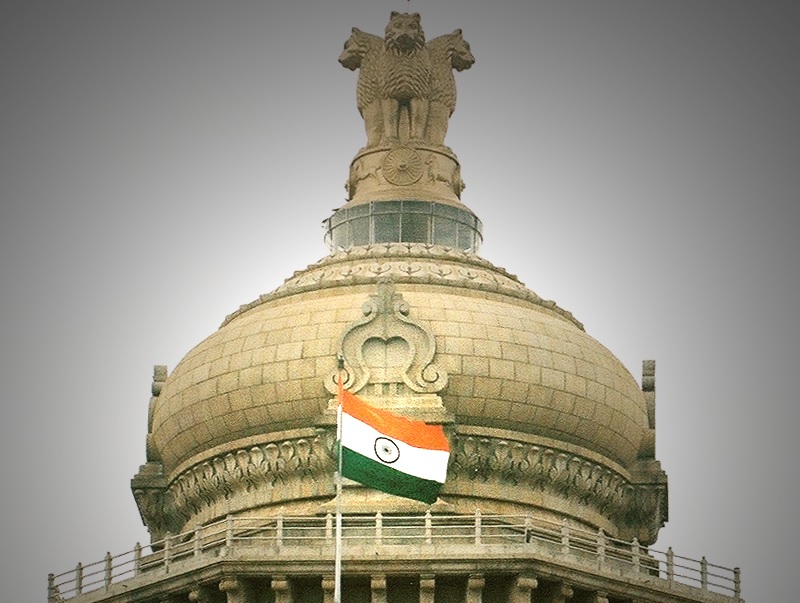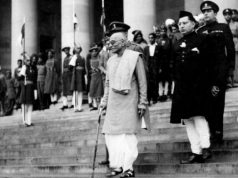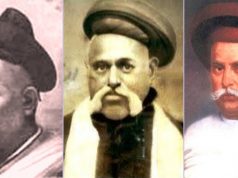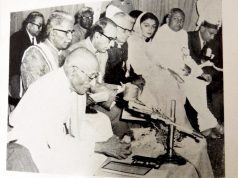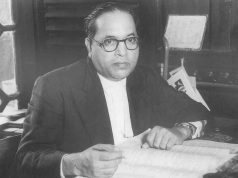The following is an article written by M A Venkata Rao in May 1959 issue of The Indian Libertarian, an independent journal of public affairs. In the article, Prof. Rao emphasises the need to limit state action from acting in the defence of vested interests.
Today we are letting the elected government of the country have everything their own way and trespass beyond the limits of governmental action blithely, in sphere after sphere of citizens’ legitimate activity. The only effective theories – (of State action, of the objectives of government policy, of the modes of private enterprise to be permitted to citizens, of the interpretation of ·the Constitution and the Fundamental Rights. the degree of official discretion in the execution of the Criminal and Penal Code circumscribing citizens’ freedom etc. –) in actual practice are those enunciated by Ministers in justification of action already taken. The vast volume of experience and guidance available in the classics of democratic government crystallised out of Eur-American experience is largely ignored. The party in power is behaving as if the majority at the polls it has secured twice running in the name of Gandhi and under the glamour of having been instrumental in securing national independence (a doubtful claim) confers on it the right and power to do everything without let or hindrance. It has assumed the notion of Omni-competence for government which is but another name for totalitarianism. The vast body of intellectuals (so-called) in the professional vocations in journalism and in the teaching line are making no contribution worth the name to clarify the issues implicit in the relations between government and the citizen under modern conditions of extreme complexity of social organisation and under conditions natural to dependent nations for long under foreign rule, struggling to establish democratic usages institutions and precedents.
THE APATHY OF THE “INTELLECTUALS”
The trend all over the globe today is towards collectivism of which the chief ingredient is socialism (and communism). India under Nehru has definitely adopted this trend, as if it were the most natural thing in the world, and as if it were the most beneficent philosophy for the state and society to adopt. The general public, without the stimulating influence of rational criticism and discussion of the principles involved (in club and office, platform and newspaper at least to the extent necessary), are not aware of the danger implicit in spontaneous and facile conformity to official views and ways. The present writer was amused and disturbed the other day when an old friend–a very intelligent and experienced teacher of long standing–said, as if it were the most natural thing in the world that “after all, our traditional ethics in the sastras and epics also taught socialism in practical effect–exhorting us to observe dharma or to do good to society. He equated the welfare state and socialism with moral tradition and behests to do good! No wonder that the ordinary man takes it for granted that the government is Ma and Bap in one and is entitled to enter every sphere of private life in the name of doing public good!
It is worthwhile reminding ourselves how large a field has already been pre-empted for state activity in the last few years.
QUICK AND RAP1D INROADS
Even as early as 1948, the industrial policy statement clearly laid down that the State reserved to itself all key lines of economic production and management–steel and iron, shipping, transport, railways, air commumcat1ons, banking, insurance, mines etc. In accordance with this policy, extended in the policy statement of 1956, which adumbrates openly and challengingly a full socialist organisation of public affairs covering the whole of the economy, leave by mercy, a certain limited sphere for private enterprise, which is also to function within the limits of overall State planning.
Next came the entry of the State into Trade–foreign and domestic–under the plea of dealing with, totalitarian States. But today we find it spreading its tentacles in trade after trade such as cement and manganese and shoes and exhibiting the all too familiar phenomenon of overcharging, extravagance and waste. The sin lies not so much in inefficiency of dealing as in depriving the public of their natural and traditional modes of earning their living.
The socialist inspiration of the policy soon came to be a cover for the profit motive. Life insurance was annexed for the public sector with scarcely concealed motives of earning profit to feed the grandiose Five-Year Plans!
The sudden and unprepared direction given by the Prime Minister, at a meeting of the National Development Council, to Chief Ministers of States to put in hand immediately a scheme of State Trading in Food Grains, covering the whole country from the Himalayas to the four seas is a peak example of the totalitarian manner in which our new democracy has started to function.
THE LANGUAGE OF THE FUEHRER
Next we see the startling suddenness in which seven provincial Banks are being taken over to Central Union Ownership. They were being controlled, along with all other banks, by the Reserve Bank without ownership but it was not deemed sufficient, apparently. Power lust on the part of Government is progressing with seven league boots in our midst!
The remaining private banks will, no doubt, be annexed before long in the same abrupt manner regardless of the criticism that may be expressed by industrial and commercial circles.
The growing intolerance towards the private sector shows itself frequently in the utterances of the Prime Minister who hints at forthcoming moved towards socialism as soon as the public seem to have digested one set of invasions of public rights.
Mr. Lal Bahadur Sastry warned industrialists the other day not to agitate for their so-called rights of private enterprise. He reminded them of the hostility of the general public towards them as a class! This is intimidation and indicates the rapid change of attitude in ministerial ranks towards totalitarian power which socialism confers on them by right of Marxist theory and the model of Soviet Russia. The theory, under whose flag Soviet Russia has grown, so fast to the position of a world power rivalling the United States, cannot be wrong! This seems to be now the mood of the Congress chota bosses under their leader Pandit Jawaharlal Nehru.
The Prime Minister himself let out the thought that the co-operative method should be applied some day as part of socialism to big industry as well! The self-employing class investing capital of its own and affording employment to labour (of brawn and brain) is therefore to be jettisoned some day. It may come sooner than anticipated.
HOLDING THE CITIZENS TO RANS0ME
Matching these incursions in industry and commerce, we have the daring and calamitous policy of throwing the entire field of agriculture throughout the vast country into the single mould of co-operative farming.
The socialist secret to this move is to capture the harvest from the hands of individual farmers. This will enable the State to give agriculturists the bare minimum of share in the crops and to maximise the share of the government, which will go to feed planning. This will facilitate the purchase of machinery and know-how from foreigners without vexatious foreign exchange complications. The system of co-operative farms (called collective farms or production co-operatives in communist countries) is meant to confer freedom of food and power on the government and not on the farmer. The motive is both economic and political. With the people’s food in their hands, government will have the whip-hand on the lives and labour of the agricultural population. All independent farmers will have been reduced to the position of hired labourers–whose conditions of work and wages will be determined by the Government.
Socialism prides itself in liquidating feudalism. But it has the notorious distinction of putting in its place a new system of serfdom more onerous than the old one under the feudal barons!
The final goal of all these piecemeal moves in our country is becoming clear even to the densest intelligence, if only it is confronted with the facts. Moves are taking place simultaneously in so many fronts that the general public are not aware of the extent of the erosion of liberties that has already taken place.
REGIMENTING THE YOUTH
In the field of education. most States have introduced the entirely objectionable policy of monopolising text book trade in all its aspects–getting authors to write, printers to print and booksellers to sell. The State has become the chief publisher or the only textbook publisher. We cannot object to the Communist Government of Kerala adopting the practice when Congress Governments themselves have set the unwholesome example.
The range of compulsion is being extended insidiously. Mr. Lal Bahadur Sastry is threatening exporters that if they do not export enough to earn the foreign exchange required for the Plans, he will introduce compulsion! Government, that is to say, will decree that a certain percentage of industrial production should be sold abroad, irrespective of profit or convenience to the producer.
Another field in which government are threatening compulsion is that of small loans to Government. lf the middle-classes from whom this kind of loan is asked do not give enough voluntarily, it is said that Government will institute a system of forced savings!
We recall the announcement by Khrushchev last year (or the year before the last) that his government would not repay the loans deducted from the salaries of Soviet wage-earners for the last twenty years–neither principal nor interest! What guarantee is there, at the rate at which socialisation is being forced on the country, that before the term announced for repayment is reached, a similar repudiation will not be made by our Government as well? Socialism justifies such repudiation.
For the cold truth is that socialism claims full control over the labour of all citizens by right of Karl Marx’s doctrine under the plea that it will lead them to the earthly paradise in the next generations.
The Ginger-Group is also whispering that it is high time to make a beginning with compulsory labour! Mr. Nanda has said that he has accepted in principle the idea of forcing the idle people in villages (why not in towns and cities, beginning with able-bodied beggars?) to work on public works such as roads and tanks for a minimum wage of 12 annas per day! It is clear that the socialist terminology of referring to human beings as labour commodity is having its natural fruits.
“MARX-IN-KHADI” SPEAKS OUT
The spirit of all these restrictions and invasions of citizens’ rights came out in a flash in a recent speech by the Prime Minister when he let out the idea that “regimentation of thought is necessary“, in so many words. If the salt itself loseth its savour, wherewith will it be salted?–is the agonising cry with which thoughtful people heard of this unguarded sally of the Prime Minister–who is regarded fondly as the hope of democracy in all the East! It is clear to all except the wilfully blind that the Prime Minister has let his socialism overcome his democracy.
What then is the remedy? The remedy consists in a widespread realisation of the primary ideas of democracy as expressed in society and State. The first such idea refers to the limits of State action.
People should be taught the original function or the State–its differentia that separates it from other social institutions. The State should go back to its fundamental functions of maintaining law and order within society through the magistracy and the policy, of adjudging the quarrels and mutual invasion of rights by citizens, of keeping each vocation within its limits by preventing it from exploiting others, and of defence against foreign invaders.
The State may perform certain services requiring uniformity and monopoly such as posts and tele· graphs, railways and ordnance.
The socialist idea of making the State sole trader, sole manufacturing, sole transporter, sole healer, sole educator, sole preacher of public morality, etc. etc. should be rendered unpopular as destroying individual liberty and democracy in due course. The theory of the omni-competence of the State implied in socialism is accompanied by a number of other assumptions which are equally deleterious and false.
Marxism is committed to the idea of the State as but a system of force used by a class in support of its sole interests. It holds that the liberal democratic State is motived by its interests in the capitalist class.
It holds that therefore there is no use in argument and persuasion with the holders of power even in a democracy! Bourgeois democracy cannot, it is said, by socialists, yield to the working class any essential right but would, rather give up the pretence of democracy and fight as a fascist State!
This conclusion is wrong. It is psychologically possible for a people to uphold the idea of the State as the agent of the common good of the whole of society. The State can be regarded as reconciler and regulator of all the conflicting interests of different classes.
For this purpose, absolute impartiality as between the interests of different pressure groups is necessary that the State should be the fountain of justice first and foremost. For this purpose, it should not identify itself with any particular class, whether of the rich or of the poor or of the middle-class. The State should be above party and class, creed and community.
It is necessary in our country today to clarify the true function of the State which are limited in aim. The freeing of the governmental apparatus from immersion in the defence of vested interests–whether of labour or of capital–is essential for the functioning of democracy and the guarantee of individual rights. It is only libertarian doctrine that upholds such a view of the State and Government. There is great need for convinced lovers of liberty to expound the faith that is in them with reference to the rapidly encroaching tentacles of governmental action and initiate a healthier stream of tendency. This is true service more important than any other so-called constructive work such as bhoodan.
Access the original text here. (page 6)
First Published in the Indian Libertarian in May 1959.
Other editions of the publication can be accessed at Indian Liberals, an open, multilingual digital archive committed to preserving liberal voices in the Indian public sphere.
Read more on the Indian liberal tradition.
Post Disclaimer
The opinions expressed in this essay are those of the authors. They do not purport to reflect the opinions or views of CCS.

